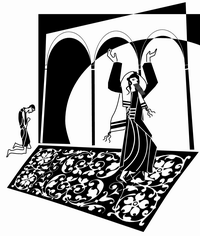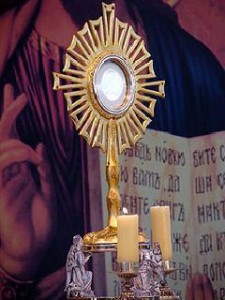 Several years ago, I appeared on a radio show where the host was a prominent Catholic. He made a comment that struck me and bothered me. The interview was made during the crisis in the Church and there was talk about a notorious priest now serving time in prison. The host said, that he felt that the priests and nuns were supposed to be holy for the laity. Now granted, it has never been the case that anyone in the Lord’s service has a calling to be unholy, however, I thought it strange that anyone would feel it was the role of priests and nuns to be holy while the laity did not enjoy that call.
Several years ago, I appeared on a radio show where the host was a prominent Catholic. He made a comment that struck me and bothered me. The interview was made during the crisis in the Church and there was talk about a notorious priest now serving time in prison. The host said, that he felt that the priests and nuns were supposed to be holy for the laity. Now granted, it has never been the case that anyone in the Lord’s service has a calling to be unholy, however, I thought it strange that anyone would feel it was the role of priests and nuns to be holy while the laity did not enjoy that call.
The call to be holy comes not from the sacrament of ordination, but the sacrament of baptism which is common to all of us.
Indeed I always point out during baptisms that when the media says that laity are all called to pay, pray and obey, it is false and that is according to the rite itself. We all have a mutual call to holiness.
The Rite of Ordination to the diocesan priesthood has two promises: promise of obedience to the bishop and celibacy, which is a promise not too marry. The promise to live a holy life is at baptism.Therefore laity and ordained are under the same promise.
However, we can fall into the error of outsourcing our holiness. That is when we look to others to be holy for us. We make a great error when we over or under estimate our respective call to holiness.
Today’s gospel highlights this and highlights it well. Remember the audience, many are looking upon the
Pharisee as being holy and even his actions as signs of his holiness. The publican was rejected by others as a sinner. He was rejected as a commoner and came from an occupation that was looked at askance and even as traitorous or crooked. However, Jesus points out that the publican was standing before God as he is, doing the best he could and all he could muster is that despite his best effort he was nothing more than a sinner. The pharisee boasts of all the great things he is. Yet, we learn in God’s eyes the demeanor of the two is the reverse. Why? Well notice one thing. Both are praying, and although praying is important, how we pray is more important. The Pharisee is self-focused and boastful, he stands before God believing he is worthy to be there. He has absolutely no appreciation for the love and mercy of God, because he believes he has earned all that God has to give. He has earned his place in God’s holy house. However, it does not work that way. We glorify God when we realize that it is only by his free gift and his action that we have even the ability to address Him. This is something the Pharisee does not understand and the publican practices.
The publican is the opposite, he is fully aware of his sinfulness, but remember Jesus also said, it is mercy I desire and not sacrifice. He is in need of God’s mercy, and the Father is all too happy to give it. The pharisee sees no need for mercy. He therefore receives none. The pharisee has shown himself in competition to be God, the publican has shown himself to recognize who is God.
How about you?
One of the most powerful moments in my life was just after I quick drinking in 1980. I was a sailor and not a practicing Catholic. I was visiting one of my favorite places at the time, The San Diego Museum of Art at Balboa Park. A shipmate with whom I had some acquaintance happened to be there and we afterward sat down for lunch at some place. It was there he happened to share that he was a Christian. It was not overwhelming and he was just a basic guy who, like me, was living as a Navy sailor doing his job as I was doing mine. His words actually led me to where I am today. Strangely, I don’t even remember his name today, just his first name and his role Frank, the 2nd class Fire Control Technician. However, his manner of living his faith simply was probably closer to that of the publican who truly was a man of faith and was closer to Christ than the pharisee.
Bishop Boles retired auxiliary bishop of Boston in an address to the priests of the Central Region this week reminded us that Jesus is aware of the struggle of his faithful. When we acknowledge our need for His love and mercy we are closer to Him. Christ’s love in mercy gives us the strength to continue our service to God.
Each one of us has the call to be in service to Christ. It does not matter whether we have a doctorate in theology or a graduation certificate from the second grade. Our holiness is not based on accomplishment, but on the wisdom that comes from drawing close to the living God. Each one of us has a call to our baptismal promises as ambassadors of the Kingdom of God. We weaken the church when we bring up an excuse for not doing this especially when we feel it is not our role to seek and live in holiness. Of course it is our role, it is the role of each one of the baptized.
Everyday, it is a good practice to understand our personal mission within the Kingdom of God, our family mission, our parish mission. It is good to recognize that we have a mission given to us at Baptism. Christ called us. He did not call us to hold the coat tails of others, He called us to serve the Kingdom of God in ways that only each one of us can do.
What will you do for the Kingdom of God this week. No excuses.
God Bless You,
Fr. Robert J Carr
Fr. Carr is an alliance member of the New Song Community (Canção Nova). He is the pastor of St. Benedict Parish in Somerville, MA and is the editor of this blog. He is also the author of a blog directed specifically to priests. That can be found at thesacramentallife.blogspot.com



